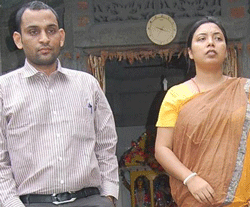
Karimganj, June 30: A woman Congress legislator from Assam was thrashed by a mob at a hotel in Karimganj town late Friday night after she converted to Islam and married a Muslim friend, police said Saturday.
Rumi Nath and her husband Jacky Jakir, who were badly injured, were being shifted to the Guwahati Medical College and Hospital Saturday for treatment, police said. Sources close to the legislator said she was pregnant.
Nath, who had won the Borkhola assembly seat in Assam's Barak Valley on a BJP ticket in 2006, had defected later and joined the Congress. She contested the 2011 assembly elections on a Congress ticket and retained the seat. She married her friend and long time family acquaintance Jacky Jakir, a Muslim by faith, last month and it angered most of her supporters. She also converted to Islam before the marriage. She, however, did not divorce her first husband, Rakesh Kumar Singh and left the daughter from her first marriage in her parents' house.
After she revealed her second marriage, some of her supporters and social organisations in the Barak Valley warned her not to enter the area. The MLA had been out of the state with her second husband since then.
"The couple came to Karimganj last evening and were staying for the night at the Hotel Nakshatra. Angry residents somehow came to about the presence of Rumi Nath and her second husband and physically assaulted the duo. Although she had body guards and police reached the spot immediately, it became difficult to control the huge mob," Karimganj Superintendent of Police Pradip Pujari told IANS.
"While we were able to rescue both of them, they have been seriously injured. Both the MLA and her husband Jacky Jakir are being shifted to Guwahati for better treatment Saturday morning," Pujari said.
"The situation has been contained as of now but we are keeping a close vigil so that it does not take any communla angle. Investigation is also on to find out the culprits involved in the incident on Friday night," he said.





Comments
Add new comment